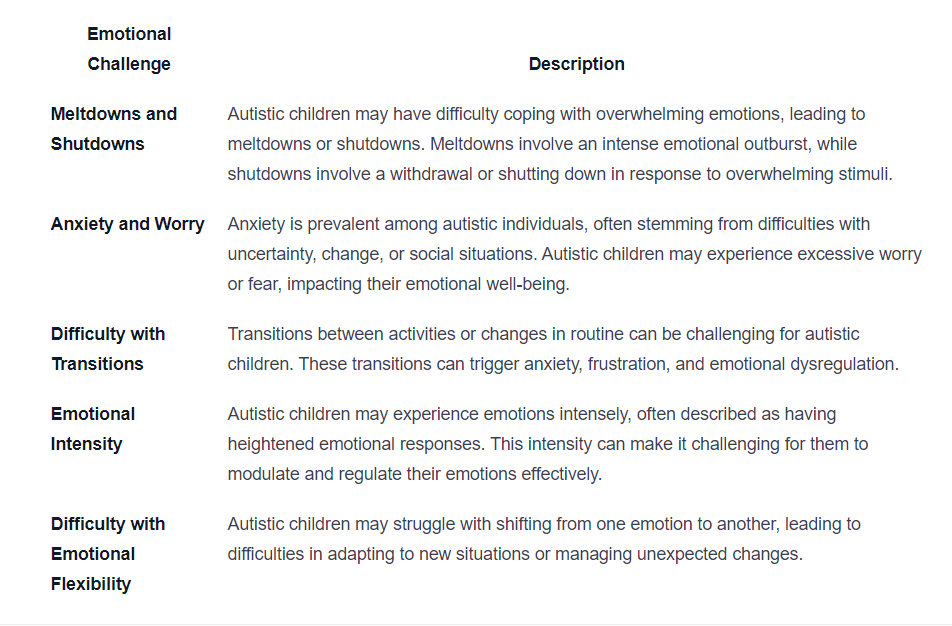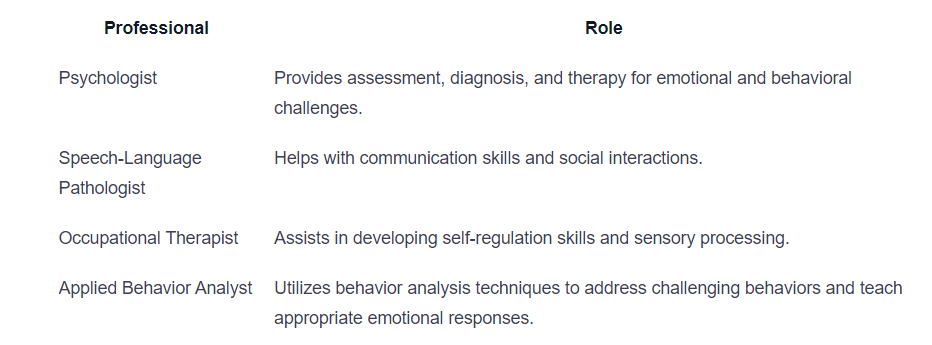Help Your Autistic Child Manage Emotions
Supporting your autistic child's emotional journey: Strategies to help them manage emotions and thrive. Empower your child with emotional well-being.

Understanding Autism and Emotions
Understanding the connection between autism and emotions is crucial for parents and caregivers in providing the necessary support for their autistic children. Autism can have a significant impact on emotional regulation, leading to unique challenges in managing emotions. By gaining insight into these aspects, caregivers can better assist their children in navigating their emotional journey.

How Autism Can Impact Emotional Regulation
Autism affects the way individuals process and regulate emotions. Autistic children may face difficulties in comprehending, expressing, and managing their emotions effectively. These challenges can stem from various factors, including:
- Sensory Sensitivities: Autistic children may experience heightened sensitivity to sensory stimuli, such as sounds, lights, or textures. These sensitivities can overwhelm them and make it harder to regulate their emotional responses.
- Difficulty with Social Cues: Understanding and interpreting social cues and non-verbal communication can be challenging for autistic children. This can lead to difficulties in recognizing and responding appropriately to others' emotions, further impacting their own emotional regulation.
- Executive Functioning: Impaired executive functioning, a cognitive process responsible for self-regulation and decision-making, is common in autism. This can affect the child's ability to plan, organize, and regulate their emotions in various situations.
Common Emotional Challenges for Autistic Children
Autistic children may experience a range of emotional challenges that require understanding and support from caregivers. These challenges can include:

By recognizing how autism can impact emotional regulation and understanding the common emotional challenges faced by autistic children, caregivers can provide targeted support and strategies to help their child navigate their emotional journey.
Building Emotional Awareness
Developing emotional awareness is an important step in supporting your autistic child's emotional well-being. By helping them recognize and express their emotions, you can empower them to navigate their emotional journey more effectively. This section will explore two key strategies: teaching emotional recognition and assisting your child in expressing their emotions.
Teaching Emotional Recognition
Teaching your child to recognize and understand emotions is a valuable skill that can enhance their emotional awareness. Here are some effective techniques to try:
- Emotion Identification: Use visual aids, such as emotion cards or charts, to help your child identify different emotions. Discuss the facial expressions, body language, and context associated with each emotion.
- Social Stories: Create social stories that depict various emotional situations and guide your child through identifying and understanding emotions. Incorporate visuals and simple language to make the stories more accessible.
- Modeling Emotions: Show your child how to express and label emotions by modeling appropriate behavior. Use everyday situations or role-play to demonstrate how different emotions are expressed and managed.
Helping Your Child Express Emotions
Once your child can recognize emotions, the next step is to help them express their emotions in a healthy and constructive manner. Here are some strategies to assist your child in expressing their emotions effectively:
- Communication Tools: Provide your child with alternative communication tools, such as visual supports or social scripts, to express their emotions when verbal communication may be challenging. This can include using emotion charts, visual schedules, or communication apps.
- Emotion Regulation Techniques: Teach your child various techniques to regulate their emotions, such as deep breathing exercises, relaxation techniques, or engaging in sensory activities. These techniques can help them calm down and manage intense emotions.
- Encourage Self-Expression: Create a safe and supportive environment where your child feels comfortable expressing their emotions. Encourage them to use words, gestures, or creative outlets like drawing or writing to express their feelings.
By focusing on building emotional awareness and providing your child with the tools to recognize and express their emotions, you can support their emotional well-being and help them navigate the challenges they may face. Remember to be patient, understanding, and consistent in your approach, as each child is unique in their emotional journey.
Strategies for Emotional Regulation
When it comes to helping your autistic child manage their emotions, implementing effective strategies for emotional regulation is crucial. By creating a calming environment, establishing predictable routines, and utilizing visual supports, you can provide the necessary structure and support to help your child navigate their emotional journey.
Creating a Calming Environment
Creating a calming environment can significantly contribute to your child's emotional well-being. Here are some strategies to consider:
- Sensory-friendly space: Designate a quiet and comfortable space where your child can retreat when they need to calm down. Ensure that the space is free from excessive sensory stimulation, such as loud noises or bright lights.
- Visual cues: Use visual cues, such as calming pictures or visual schedules, to help your child understand and anticipate their daily routines. Visual supports can provide a sense of structure and reduce anxiety.
- Regulating sensory input: Pay attention to your child's sensory sensitivities and make adjustments accordingly. This may involve minimizing background noise, using soft lighting, or providing sensory tools like fidget toys or weighted blankets.
Establishing Predictable Routines
Predictable routines can be incredibly beneficial for autistic children, as they provide a sense of structure and security. Consider the following strategies:
- Consistency: Establish consistent daily routines, including fixed times for meals, activities, and bedtime. Consistency can help your child feel more secure and in control of their environment.
- Visual schedules: Utilize visual schedules to outline daily activities and transitions. Visual schedules can help your child understand what to expect and reduce anxiety associated with changes in routine.
- Clear expectations: Clearly communicate expectations and provide clear instructions to your child. Breaking down tasks into smaller, manageable steps can help your child navigate their daily routines more effectively.
Utilizing Visual Supports
Visual supports can play a vital role in supporting your autistic child's emotional regulation. Consider the following visual supports:
- Social stories: Create social stories that describe various emotions and appropriate ways to express them. Social stories can help your child understand and navigate complex emotions.
- Feelings charts: Utilize feelings charts that display different emotions with corresponding facial expressions. This can help your child recognize and label their own emotions, as well as understand the emotions of others.
- Visual cues for coping strategies: Develop visual cues or a "toolbox" that includes visual representations of various coping strategies. These visual supports can help your child identify and implement appropriate strategies when they are feeling overwhelmed.
By implementing these strategies for emotional regulation, you can create a supportive environment for your autistic child to navigate their emotions. Remember that every child is unique, so it may be helpful to observe and adapt these strategies to best meet your child's individual needs.
Supporting Social Skills
When it comes to supporting the social skills of autistic children, there are various strategies that can be beneficial. Encouraging positive interactions and teaching empathy and perspective-taking are two essential aspects of this process.
Encouraging Positive Interactions
Encouraging positive interactions is crucial for the social development of autistic children. Here are some strategies to consider:
- Modeling Social Skills: Demonstrate appropriate social behaviors and communication techniques through your own actions. Children often learn by observing and imitating others, so being a positive role model can help them understand how to interact with others effectively.
- Structured Playdates: Arrange playdates with peers who can provide a supportive and understanding environment. Structured playdates with clear guidelines and activities can help facilitate positive social interactions and build friendships.
- Social Stories: Utilize social stories, which are visual narratives that depict social situations, to help your child understand and navigate different social scenarios. These stories can provide clear explanations of appropriate behaviors and help your child feel more confident in social interactions.
- Social Skills Groups: Consider enrolling your child in social skills groups or programs specifically designed for autistic children. These groups provide opportunities to practice social skills in a structured setting with the guidance of trained professionals.
Teaching Empathy and Perspective-Taking
Empathy and perspective-taking are important skills that contribute to healthy social interactions. Here are some strategies to help teach these skills to your autistic child:
- Emotional Vocabulary: Teach your child to identify and label different emotions. Use visual aids, such as emotion charts or emotion cards, to help them understand and recognize various feelings. This can serve as a foundation for developing empathy towards others.
- Role-Playing: Engage in role-playing activities where you and your child take turns pretending to be different people in various social situations. This can help them understand different perspectives and develop empathy by imagining how others may feel in certain situations.
- Books and Media: Read books or watch movies and TV shows that depict characters experiencing different emotions and situations. Use these stories as opportunities to discuss and explore different perspectives and feelings.
- Problem-Solving Scenarios: Present your child with hypothetical social scenarios and engage them in problem-solving discussions. Encourage them to consider how they would feel and how others involved might feel, as well as brainstorming appropriate responses or solutions.
By encouraging positive interactions and teaching empathy and perspective-taking, you can support your autistic child in developing essential social skills. Remember to be patient, provide ongoing guidance, and celebrate their progress along the way.
Seeking Professional Support
When it comes to supporting your autistic child's emotional well-being, seeking professional support can be invaluable. Therapists and specialists who specialize in working with autistic individuals can provide guidance, strategies, and interventions tailored to your child's specific needs. In this section, we will explore the importance of working with therapists and specialists and the various therapeutic interventions available.
Working with Therapists and Specialists
Therapists and specialists who have experience working with autistic children can offer valuable insights into managing emotions and addressing emotional challenges. They are equipped with the knowledge and skills to create individualized plans and interventions that support your child's emotional development.
Here are some common professionals you may consider working with:

Collaborating with these professionals can help you gain a better understanding of your child's emotional needs and provide you with effective strategies to support their emotional well-being.
Exploring Therapeutic Interventions
Therapeutic interventions can play a crucial role in helping your autistic child manage their emotions. These interventions are designed to teach emotional regulation skills, improve social interactions, and enhance overall emotional well-being. Here are some commonly used therapeutic interventions:
Cognitive-Behavioral Therapy (CBT)
CBT is a goal-oriented therapy that focuses on identifying and changing negative thoughts, emotions, and behaviors. It can help your child develop coping strategies, enhance emotional regulation skills, and challenge unhelpful beliefs.
Social Skills Training
Social skills training aims to improve your child's social interactions and communication abilities. It involves teaching skills such as initiating and maintaining conversations, understanding social cues, and developing empathy.
Play Therapy
Play therapy provides a safe and supportive environment for your child to express their emotions and develop emotional regulation skills. Through play, therapists can help your child explore and process their feelings, enhancing their emotional well-being.
Mindfulness-Based Interventions
Mindfulness-based interventions focus on cultivating present-moment awareness and acceptance. These interventions can help your child develop self-regulation skills, reduce stress, and improve emotional resilience.
Sensory Integration Therapy
Sensory integration therapy addresses difficulties in processing sensory information. By providing structured sensory experiences, therapists can help your child manage sensory sensitivities, which can in turn impact emotional regulation.
It's important to remember that the effectiveness of therapeutic interventions may vary for each child. Working closely with therapists and specialists will allow you to determine the most suitable interventions for your child's unique needs.
By seeking professional support and exploring therapeutic interventions, you can provide your autistic child with the tools and strategies they need to effectively manage their emotions. Remember to consult with professionals who specialize in working with autistic individuals to ensure the best possible support for your child.
Self-Care for Parents
Caring for an autistic child can be emotionally demanding, and it's essential for parents to prioritize their own well-being. Taking care of yourself allows you to better support your child's emotional journey. Here are some strategies for self-care:
Managing Parental Stress
Parenting a child with autism can be challenging and stressful at times. It's important to recognize and manage your own stress levels. Engaging in stress-reducing activities can help you maintain a sense of calm and balance. Consider incorporating the following into your routine:
Stress-Reducing Activities
Practice deep breathing exercises
Engage in regular physical exercise
Practice mindfulness or meditation
Engage in hobbies or activities that bring you joy
Seek support from friends and family
Seeking Support Networks
Building a support network is crucial for parents of autistic children. Connecting with other parents who have similar experiences can provide a sense of community and understanding. Consider joining support groups, both online and offline, where you can share your thoughts, concerns, and triumphs with others who can relate.
Support Networks
Join local or online support groups for parents of autistic children
Attend workshops or conferences focused on autism
Seek out parent advocacy organizations
Connect with other parents through social media or online forums
Practicing Self-Compassion and Understanding
It's important to practice self-compassion and understanding as you navigate the challenges of raising an autistic child. Remember that it is normal to feel a range of emotions, including frustration or guilt. Be kind to yourself and acknowledge that you are doing your best in a complex situation. Consider the following strategies:
Self-Compassion and Understanding
Practice self-acceptance and celebrate your accomplishments
Give yourself permission to take breaks and prioritize self-care
Educate yourself about autism to better understand your child's needs
Seek professional help or counseling if needed
Practice positive self-talk and affirmations
Remember, taking care of yourself is not selfish but rather an important part of being able to support your autistic child emotionally. By managing parental stress, seeking support networks, and practicing self-compassion and understanding, you can create a nurturing environment for both yourself and your child.
Sources
https://www.verywellhealth.com/helping-children-with-autism-handle-emotions-260146
https://www.autismparentingmagazine.com/help-child-with-emotional-regulation/
Similar articles
We’re here to help you

Our team is here to assist you in this process. Contact us for any assistance.
it’s easy to apply
We Accept Most Insurances
Our in-network insurance partnerships make ABA therapy more accessible to families throughout our service areas.







Our Insurance Process
We'll request your insurance details to help us verify your plan's coverage for ABA therapy. Once we've received this information, we'll walk you through your benefits, including copayments, deductibles and out-of-pocket maximums, so you know what to expect in advance.
Our team will then handle the preauthorization and all the necessary paperwork.
.svg)





















.jpeg)


































.jpeg)




.jpeg)







.jpeg)











.jpeg)
















